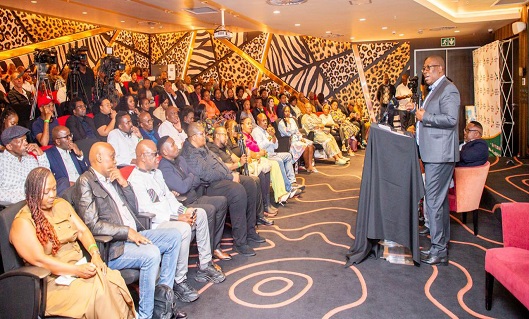
Thembisa Shologu
Following his 2024 State of the Province Address (SOPA), Premier Panyaza Lesufi engaged with professionals, academics, and entrepreneurs in a series of post-SOPA sectoral meetings.
These meetings begin a comprehensive outreach initiative to explore avenues for collective growth in Gauteng.
The inaugural engagement, held at Hotel Sky in Sandton, was conducted in collaboration with the Progressive Professionals Forum (PPF) to foster stronger ties within academia, business, and professional circles.
Speaking at the gathering, Premier Panyaza Lesufi said the Gauteng Provincial Government (GPG) need skilled personnel to propel Gauteng towards its next development phase.
“We need to transit; the gold everyone came for in Gauteng is gone; let us repackage our province and put economic growth that will assist us.
“The first key economic driver here is the financial sector; ensure all banks are here, we need to create and consolidate an environment that is conducive for them to do business here, the second one is the insurance sector, and the third is the telecommunications and the pharmaceutical institutions that are also here, they are assisting us and are growing with us and providing all the necessary resources,” Lesufi stated.
The premier highlighted the potential of Gauteng’s southern region, envisioning the transformation of the Vaal River into a hub for water-based activities, drawing inspiration from global examples like Dubai.
He reiterated his commitment to halting the proliferation of informal settlements, advocating for comprehensive interventions in hostel communities to address socio-economic disparities.
Lesufi said that to unlock Gauteng, there was a need to overhaul the state to address all the issues of crime and poverty, eliminate informal settlements, and create job opportunities in Gauteng.
“You can’t have so many people in the township unemployed. We want to kickstart the economy of our townships, which is bold and brave, but it needs resources and a state that can do those things.
“We do not have that capacity, so we need to build that capacity and improve our townships and the areas that we live in. We are putting up all these things to ensure that the state has the capacity, and we can improve it,” he said.
He underscored Gauteng’s pivotal role in the national economy, emphasising the imperative of equitable resource allocation and transparent governance processes.
“If Gauteng can’t perform, the country won’t perform. If Gauteng can’t contribute its fair share of its economic activities, we will not have a country to create opportunities for,” said Premier Lesufi.
Progressive Professionals Forum (PPF) Provincial Chairperson Herman Radali urged government for a fair process in availing opportunities and concerted effort to combat corruption and ensure accountability in public service delivery.
“Currently, we have all these good policies, but corruption is making those policies look as if you do not love the people of South Africa (SA). Every rand in revenue must be accounted for meticulously, ensuring it reaches the grassroots beneficiaries without being tempered along the way.
“This is not just a plea; it is a call for a fundamental shift in the way we govern ourselves. The middle structure represented by PPF implores you and demands that we do away with just rhetoric,” said Radali.
He implored everyone to establish a clean, effective government because, with this, those aspirations for a prosperous and just Gauteng may be attainable.
He said there was an urgent need for the provincial government to monitor and ensure that the Board-Based Black Economic Empowerment (B-BBEE) programme must be implemented accordingly.
“This is where you will get your free budget for supply development, enterprise development, social CSI and much-needed skills development. You do not have to look for new money if the HODs are complying in implementing the programme, “he said.
Former Statistician-General of South Africa, Pali Lehotla, lamented the persistently low skill levels among black South Africans and called for urgent reforms in the education system to bridge the gap.
SOURCED FROM THE GPG WEBSITE.
Since 1994, the skill level of black people remained at 17% against the skill level of whites at 50%, Indians at 45% and coloureds at 20%.
“Today, as I speak, in 2024, the skill level of blacks is still at 17%; you cannot build this economy at that level. It is impossible.
“You cannot be 90%b of the population and operate at a skill level of 17%; Indians and whites have grown to 66%. So, the arithmetic is obvious that we are stuck in a group of 17% and we think that at that skill level we can change the country, we can’t and not when the education system is not delivering, absolutely not delivering,” said Pali.
SOURCED FROM THE GPG WEBSITE.

